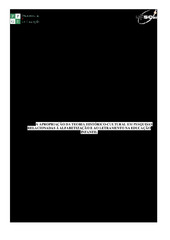| dc.contributor.author | Souza, Élica dos Santos | |
| dc.date.accessioned | 2021-07-14T11:20:10Z | |
| dc.date.available | 2021-07-14T11:20:10Z | |
| dc.date.issued | 2021-06-18 | |
| dc.identifier.citation | SOUZA, Élica dos Santos. A apropriação da teoria histórico-cultural em pesquisas relacionadas à alfabetização e ao letramento na educação infantil. 2021. Dissertação (Mestrado em Educação) – Universidade Federal de São Carlos, São Carlos, 2021. Disponível em: https://repositorio.ufscar.br/handle/ufscar/14596. | * |
| dc.identifier.uri | https://repositorio.ufscar.br/handle/ufscar/14596 | |
| dc.description.abstract | The present master's dissertation had as its research question: How has the so-called "historical-cultural psychology, historical-cultural perspective, historical-cultural approach, historical-cultural matrix, historical-cultural conception, historical-cultural concept", been configured in the studies on literacy and literacy focused on the education of children under 5 years old? And as a general goals to identify and analyze the appropriation of Historical-Cultural Theory (learning, development, teaching of reading and writing) in research on literacy and literacy in early childhood education. Thus, for the development of our goal, we use as methodology, the theoretical-bibliographical research of theses in the Catalogue of Theses and Dissertations of Capes published between 2013 and 2016, which address the issue of literacy and literacy in early childhood education and are also based on the assumptions of Historical-Cultural Theory. As theoretical basis we use the concepts of Historical-Cultural Theory, such as the psychological development of the child, his learning, the acquisition of language, the constitution of his conscience and his perception of the world, in the studies produced by Vigotski, Luria and Leontiev. After our analyses, we consider that the Historical-Cultural Theory was configured in the theses as a tool to characterize the best pedagogical practices to be carried out with children in Early Childhood Education and also to demonstrate that school education is responsible for the construction of scientific knowledge and for the development of higher psychic functions. We also understand that the theses did not go much beyond what the official documents of the MEC, directed to this stage of education, have already presented, in order to obtain new data and results, thus not having a distance, and these aspects are inserted in the so-called "grammar of schooling". We also emphasize that the teacher's role is fundamental and he/she needs to master pedagogical techniques to teach children scientific knowledge and language use skills and metalinguistic concepts. | eng |
| dc.description.sponsorship | Coordenação de Aperfeiçoamento de Pessoal de Nível Superior (CAPES) | por |
| dc.language.iso | por | por |
| dc.publisher | Universidade Federal de São Carlos | por |
| dc.rights | Attribution-NonCommercial-NoDerivs 3.0 Brazil | * |
| dc.rights.uri | http://creativecommons.org/licenses/by-nc-nd/3.0/br/ | * |
| dc.subject | Teoria Histórico-Cultural | por |
| dc.subject | Educação infantil | por |
| dc.subject | Alfabetização e letramento | por |
| dc.subject | Historical-Cultural Theory | eng |
| dc.subject | Early childhood education | eng |
| dc.subject | Literacy and literacy | eng |
| dc.title | A apropriação da teoria histórico-cultural em pesquisas relacionadas à alfabetização e ao letramento na educação infantil | por |
| dc.title.alternative | The appropriation of cultural-historical theory in research related to literacy and literacy in early childhood education | eng |
| dc.type | Dissertação | por |
| dc.contributor.advisor1 | Hai, Alessandra Arce | |
| dc.contributor.advisor1Lattes | http://lattes.cnpq.br/3845288858275245 | por |
| dc.description.resumo | A presente dissertação de mestrado teve como questão de pesquisa: Como a chamada “psicologia histórico-cultural, perspectiva histórico-cultural, abordagem histórico-cultural, matriz histórico-cultural, concepção histórico-cultural, conceito histórico-cultural”, tem se configurado nos estudos sobre a alfabetização e o letramento voltados para a educação de crianças menores de 5 anos? E como objetivo geral identificar e analisar a apropriação da Teoria Histórico-Cultural (aprendizagem, desenvolvimento, ensino de leitura e escrita) nas pesquisas sobre alfabetização e letramento na Educação Infantil. Assim, para o desenvolvimento do nosso objetivo, utilizamos como metodologia, a pesquisa teórico-bibliográfica de teses no Catálogo de Teses e Dissertações da Capes publicadas entre os anos de 2013 e 2016, que abordem a temática alfabetização e letramento na Educação Infantil e estejam baseadas também nos pressupostos da Teoria Histórico-Cultural. Como fundamentação teórica utilizamos os conceitos da Teoria Histórico-Cultural, como por exemplo, o desenvolvimento psicológico da criança, a sua aprendizagem, a aquisição da linguagem, a constituição da sua consciência e sua percepção de mundo, nos estudos produzidos por Vigotski, Luria e Leontiev. Após as nossas análises, consideramos que a Teoria Histórico-Cultural foi configurada nas teses com uma ferramenta para caracterizar, as melhores práticas pedagógicas para se realizar com as crianças da Educação Infantil e para demonstrar também, que a educação escolar é encarregada pela construção do conhecimento científico, e pelo desenvolvimento das funções psíquicas superiores, e por isso dá necessidade de apresentar esses conceitos desde a Educação Infantil. Compreendemos também, que as teses não saíram muito do que os documentos oficiais do MEC, direcionados para essa etapa de ensino, já apresentaram, para se obter novos dados e resultados, não havendo assim um distanciamento, e esses aspectos estão inseridos na chamada “gramática da escolarização”. Ressaltamos além disso, que o papel do professor é fundamental e ele necessita ter o domínio das técnicas pedagógicas para ensinar o conhecimento científico as crianças e as habilidades do uso da língua e dos conceitos metalinguísticos. | por |
| dc.publisher.initials | UFSCar | por |
| dc.publisher.program | Programa de Pós-Graduação em Educação - PPGE | por |
| dc.subject.cnpq | CIENCIAS HUMANAS::EDUCACAO::ENSINO-APRENDIZAGEM | por |
| dc.description.sponsorshipId | CAPES: Código de Financiamento 001 | por |
| dc.publisher.address | Câmpus São Carlos | por |
| dc.contributor.authorlattes | http://lattes.cnpq.br/3934895538910209 | por |


